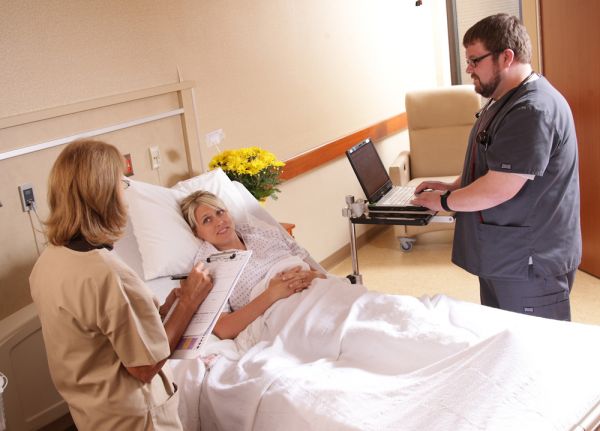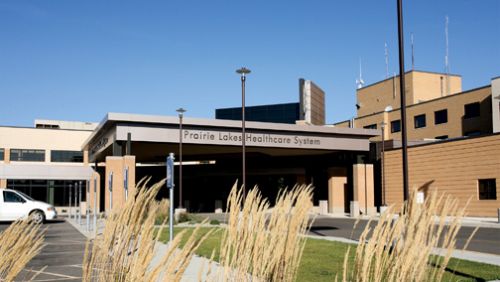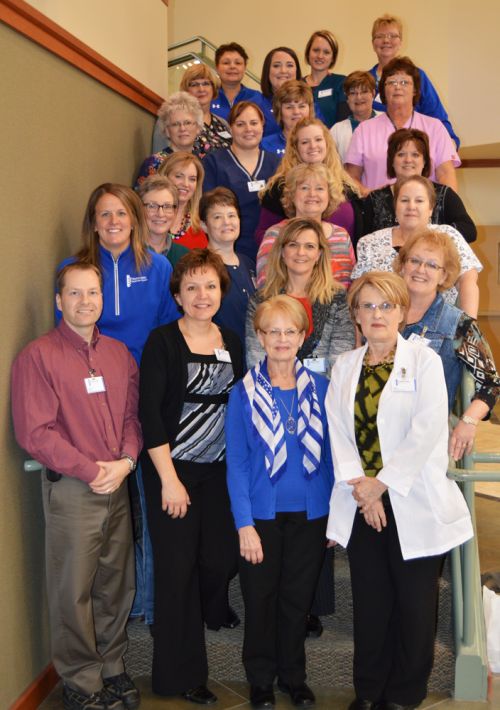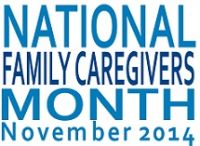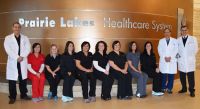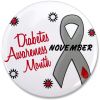Wednesday, December 10, 2014
Prairie Lakes Improves Quality for Patients by Using Technology
Prairie Lakes Healthcare System has successfully attested for Stage Two Meaningful Use and is proud to be the first healthcare facility in the state to do so. Meaningful Use is a nationwide program with three stages of objectives to use certified electronic health records (EHR) technology to improve quality and efficiency of care, engage patients and family, improve care coordination, and improve population health. Attestation is a process that documents Prairie Lakes has successfully demonstrated and is successfully fulfilling the Stage Two requirements for EHR and related technology.
Prairie Lakes attested for Stage Two by maximizing the use of technology to meet the Meaningful Use objectives. These objectives support Prairie Lakes’ mission to provide high quality, affordable, and compassionate healthcare services in our region. “After hard work, dedication, and determination from the entire team at Prairie Lakes we achieved Stage Two Meaningful Use and we are the only healthcare facility in South Dakota to do so at this time,” said Jill Fuller, President and CEO of Prairie Lakes. “This milestone is an outcome of Prairie Lakes’ continual improvement of its healthcare services and technologies.”
The objectives of Meaningful Use have lead to the development of the Patient Portal at prairielakes.com. Patients who have been hospitalized can use this online portal to view their allergies, immunizations, active and inactive medications, health history, and test results from Prairie Lakes. This allows patients to be engaged and informed about their health.
Published in
News and Announcements
Monday, December 08, 2014
Protect Your Family with an Influenza Vaccination
Influenza (the flu) can be a serious disease that can lead to hospitalization and sometimes even death. Anyone can get sick from the flu. National Influenza Vaccination Week provides an important opportunity for our community to tell people how important it is to get an annual flu shot. Getting vaccinated is the single best way for people to protect not only themselves against flu, but their loved ones as well.
Much of the U.S. population is at increased risk from serious flu complications, either because of their age or because they have a medical condition like asthma, diabetes (type 1 and 2), or heart conditions; or because they are pregnant. For example, more than 30 percent of people 50 through 64 years of age have one or more chronic medical conditions that put them at increased risk of serious complications from flu. The flu vaccination can help protect you or people you know who are at greater risk of getting seriously ill from flu (especially infants younger than 6 months old who are too young to get vaccinated).
Symptoms of the flu can include fever, cough, sore throat, runny or stuffy nose, body aches, headache, chills and fatigue. Some people may also have vomiting and diarrhea. People may be infected with the flu and have no symptoms at all, or have only respiratory symptoms without a fever. The flu vaccination can keep you from getting sick from flu, may make your illness milder if you do get sick, and reduces the risk of more serious flu outcomes, like hospitalizations and deaths.
In the United States, thousands of healthy adults and children see a doctor or are hospitalized from flu complications each year. Flu vaccination can help protect you and your family from the flu and its complications. For more information on influenza and the vaccination, please visit the CDC's website.
Published in
News and Announcements
Wednesday, December 03, 2014
Safety First When It Comes To Gift Giving
With the holidays in full swing, it’s time to start checking off our gift list. Toys can be so fun to buy for children, but some can be dangerous.
According to the US Consumer Product Safety Commission, an estimated 265,000 emergency room visits were toy-related injuries. Before purchasing a toy or gift for a child follow these tips:
-
Read all warnings and instructions.
-
Is the toy appropriate for the child's age?
-
Avoid toys with sharp points or dangerous edges.
-
Buy toys that will withstand impact.
-
Sports gifts should always be accompanied by protective gear.
-
Don’t give toys with small parts, especially young children.
- Don’t purchase toys with strings or cords.
Published in
News and Announcements
Monday, December 01, 2014
Give the Gift of Early Detection
Prairie Lakes offers screenings for stroke, heart attack, and heart disease with the Stroke Detect and Target Heart programs. For only $45 you can give someone you love the thoughtful gift of a screening.
No doctor referral is needed. Both Men and Women 40-75 years of age are eligible for Stroke Detect and Target Heart. Both programs can be purchased by cash or check from Radiology on Prairie Lakes' main campus.
Stroke Detect: Consider this program if you or your loved one has one of these risk factors:
- Over age 40
- Family history of heart disease or stroke
- High cholesterol
- History of smoking
- High blood pressure
- High stress levels
- Sedentary lifestyle
- Diabetes
- Overweight
Target Heart: Consider this program if you or your loved one has one of these risk factors:
- Family history of heart disease
- High cholesterol
- History of smoking
- High blood pressure
- High stress levels
- Sedentary lifestyle
- Diabetes
- Overweight
- Postmenopausal female
Published in
News and Announcements
Wednesday, November 26, 2014
Keeping it Local
Prairie Lakes collaborates to bring quality healthcare to our region. Jill Fuller, CEO and President of Prairie Lakes emphasizes that in an interview with Kris Bevill for the November, 2014 Edition of Prairie Business. The article includes interviews from three independent healthcare organizations about their strategies to thrive. Kris Bevill of Prairie Business Magazine writes:
Fuller says another benefit of being independent is the ability to partner with multiple entities, regardless of affiliation. Prairie Lakes is committed to providing specialty care for approximately 87,000 people within the 10-county area it serves, but the medical center in Watertown is about 100 miles away from the nearest large health care system. So Fuller says Prairie Lakes teams with both of the closest large providers — Sanford Health and Avera — as well as critical access hospitals in its area, to bring in primary care providers from large systems and to send out its own specialists where needed.
“Our philosophy is that people should get health care as close to their own home as possible,” Fuller says. “They should be able to choose their doctor. We like to say we’re independent but we’re not a stand-alone hospital,” she says. “I think if we were isolated and in our own little world, our challenges would be incredible because we wouldn't be keeping up with best practices. But we’re not stand-alone.”
Published in
News and Announcements
Monday, November 24, 2014
Home Care and Hospice Month
This month we honor Home Care and Hospice staff. Home Health and Hospice services allow people to get the help they need where they want to be… in their homes.
We recognize that caring for a loved one who is still living at home is difficult sometimes. Providing the care needed on a regular basis may not be realistic for family members. Prairie Lakes offers Home Health services like rehab, personal care, and nursing care. Our staff provide not only assistance, but emotional support.
Members of the community often call our hospice staff "hospice angels". Families tell us our care makes a critical difference in their lives at a very critical time for the family. Hospice's total support system provides skilled nursing care and support for the family.
Published in
News and Announcements
Wednesday, November 19, 2014
National Family Caregivers Month
November is a month filled with health observances. One that doesn’t get talked about enough is National Family Caregivers. There are over 90 million family caregivers in the nation, lets recognize them this month for allowing their loved ones to stay home longer.
Take a look at these amazing facts collected by the Caregiver Action Network:
-
Most adults would prefer to age in place. 90% of adults over the age of 65 would prefer to stay in their current home as they age. Family, friends, and neighbors provide 80% of the care for the elderly.
-
Two out of every 5 adults are family caregivers. 39% of all adult Americans are caring for a loved one who is sick, disabled, or living with frailties of old age. That’s up from 30% in 2010.
-
Family caregivers are the only people who are present with patients in all care settings. Patients may have more than one doctor; nurses change shifts; prescriptions may be filled at different pharmacies. But family caregivers are there as full partners with their loved ones through it all.
-
Complex care happens in the home.Almost half of family caregivers perform sophisticated medical/nursing tasks for their loved ones – such as providing wound care and operating specialized medical equipment – and up to 70% manage medications for their loved ones.
-
Caregiving affects the whole family. Men are now almost as likely to say they are family caregivers as women are (37% of men; 40% of women). And even 36% of younger Americans between ages 18 and 29 say they are family caregivers!
Many families make changes at home because of their caregiving responsibilities. Some families have to tighten their belts at home to pay for out-of-pocket caregiving costs (an average of $5,500 per year). And many more have to make home alterations to ensure safety, security, and cleanliness for their loved ones.
Published in
News and Announcements
Tuesday, November 18, 2014
Awarded Platinum for Second Consecutive Year
Prairie Lakes Healthcare System has received the American College of Cardiology Foundation’s NCDR ACTION Registry–GWTG Platinum Performance Achievement Award for the second consecutive year.
The Center of Disease Control estimates that over 700,000 Americans suffer a heart attack each year. This award recognizes Prairie Lakes’ commitment and success in implementing a higher standard of care for heart attack patients, and signifies that Prairie Lakes has reached an aggressive goal of treating these patients to standard levels of care as outlined by the American College of Cardiology/American Heart Association (ACC/AHA) clinical guidelines and recommendations.
“We are honored to receive this award for the second consecutive year,” said Jill Fuller, President and CEO of Prairie Lakes. “This award recognizes the quality of our doctors and staff. Heart services in Watertown meet the highest, national standards of care.”
To receive the ACTION Registry–GWTG Platinum Performance Achievement Award, Prairie Lakes Healthcare System consistently followed the treatment guidelines in the ACTION Registry–GWTG Premier for eight consecutive quarters and met a performance standard of 90 percent for specific performance measures. Full participation in the registry engages hospitals in a robust quality improvement process using data to drive improvements in adherence to guideline recommendations and overall quality of care provided to heart attack patients.
“Prairie Lakes is focused on improving the quality of cardiovascular care by implementing ACTION Registry–GWTG. What does this award mean to our community? Well it proves that you can receive high-quality heart services right here in Watertown. Receiving this award for the second consecutive year reflects on our team’s hard work and dedication to provide quality care to heart attack patients,” said Leah Le, Cath Lab Director.
The American College of Cardiology Foundation and the American Heart Association commend Prairie Lakes Healthcare System for its success in implementing standards of care and protocols. ACTION Registry–GWTG is a partnership between the American College of Cardiology Foundation and the American Heart Association with partnering support from the American College of Emergency Physicians and the Society of Cardiovascular Patient Care.
Published in
News and Announcements
Saturday, November 15, 2014
Diabetes Friendly Recipes
This week Prairie Lakes/Sodexo Dietitians bring you a Balsamic Glazed Salmon with Easy Half-Mashed Potatoes, a Roasted Asparagus Salad, and a 8 oz glass of milk. Yum! Total carbs: 48 grams.
Balsamic Glazed Salmon: 17g carbs, 280 calories, 26g protein. Serves 2.
Ingredients: ½ cup balsamic vinegar | 2 teaspoons Dijon mustard | 2 teaspoons honey | 2 (4-ounce) salmon filets | ½ green onion, chopped
Instructions:
1) Preheat the oven to 400 degrees F. Place parchment paper on a baking sheet.
2) In a small saucepan, bring the vinegar, Dijon mustard, and honey to a boil over medium heat. Reduce the heat to a simmer and cook until thick, about 10 minutes.
3) Brush the salmon filets with half of the balsamic glaze and reserve the other half. Bake the salmon for 10-14 minutes, or until the salmon is cooked through and flakes easily with a fork.
4) Remove the salmon from the oven and pour the remaining glaze over the salmon. Top with green onion and serve hot.
Easy Half-Mashed Potatoes: 16g carbs, 110 calories, 2g protein. Serves 11. (Use the leftovers for potatoe pancakes, pot pies, and soups)
Ingredients: 24 ounce (1lb 8 oz) bag fingerling petite potatoes, cut into 1-inch rounds with skin-on | 16-ounce bag frozen cauliflower florets | 1/3 cup skim milk | 5 tablespoons Smart Balance margarine | 1/2 teaspoon salt | 1/2 teaspoon ground black pepper
Instructions:
1) Add potatoes to a large soup pot. Cover with cold water and bring to a boil. Cook for 15 minutes.
2) Add cauliflower to pot, return to a boil, and cook for 5 more minutes.
3) Drain potatoes and cauliflower and return to pot.
4) Add remaining ingredients and mash mixture with a potato masher.Mix with an electric mixer on low-speed for about 1 minute.
Roasted Asparagus Salad: 3g carbs, 45 calories, 2g protein. Serves 2.
Ingredients: 8 medium asparagus spears, trimmed and patted very dry | 1 tablespoon chopped walnuts | 2 teaspoons light balsamic vinaigrette | Pepper, to taste (coarsely ground preferred)
Instructions:
1) Preheat oven to 425 degrees F. Line a baking sheet with aluminum foil. Lightly spray with cooking spray.
2) Arrange the asparagus in a single layer on the baking sheet.
3) Sprinkle the walnuts around the asparagus. Lightly spray the asparagus with cooking spray. Roll back and forth to coat.
4) Roast for 5 minutes. Using tongs, turn the asparagus over gently.
5) Roast for 4 minutes, or until the walnuts begin to brown. Transfer to a plate.
6) Spoon the vinaigrette over the asparagus and walnuts. Roll back and forth to coat.
7) Sprinkle with the pepper. Let stand for 10 minutes so the flavors blend.
Visit next week for healthy Thanksgiving meal recipes! Find more recipes for healthy living by the American Diabetes Association.
Published in
News and Announcements
Tuesday, November 11, 2014
Lung Cancer Therapies
Not only is lung cancer the leading cause of cancer deaths in the US, but globally as well.
Now is a perfect time to recognize the impact of lung cancer and become aware of recent research and studies. Unfortunately, lung cancer is most often caught in advance stages. Recognizing this, research efforts are starting to be focused on developing treatments that can improve survival rates.
Therapies that focus on boosting the immune system have proven to be very promising treatments for patients with advanced lung cancer. There are three different immune therapies and one that is already approved for use. Learn more about these exciting therapies and make sure to take a look at the Prairie Lakes Cancer Center for more information.
Published in
News and Announcements
More...
Monday, November 10, 2014
Heavy Snow Health Hazards
Today marks the first snow storm for the Watertown area. It may look beautiful, but the snow is heavy and can be hazardous to your health. The American Heart Association gives these tips for the winter:
- Take frequent breaks.
- Don’t eat a heavy meal prior or soon after shoveling. Eating a large meal can put an extra load on your heart.
- Use a small shovel or consider a snow thrower. The act of lifting heavy snow can raise blood pressure acutely during the lift. It is safer to lift smaller amounts more times, than to lug a few huge shovelfuls of snow. When possible, simply push the snow.
- Don’t drink alcoholic beverages before or immediately after shoveling. Alcohol may increase a person’s sensation of warmth and may cause them to underestimate the extra strain their body is under in the cold.
- Be aware of the dangers of hypothermia. Heart failure causes most deaths in hypothermia. To prevent hypothermia, dress in layers of warm clothing, which traps air between layers forming a protective insulation. Wear a hat because much of your body’s heat can be lost through your head.
Heart Attack Warning Signs
Even if you’re not sure it’s a heart attack, have it checked out. Minutes matter! Don’t wait more than five minutes to call 9-1-1. Prairie Lakes Cardiology team is available 24 hours a day, 7 days a week. With an on-site cath lab and a team of highly trained clinical staff and physicians, Prairie Lakes is equipped to handle any heart care emergency.
Even if you’re not sure it’s a heart attack, have it checked out. Minutes matter! Don’t wait more than five minutes to call 9-1-1. Prairie Lakes Cardiology team is available 24 hours a day, 7 days a week. With an on-site cath lab and a team of highly trained clinical staff and physicians, Prairie Lakes is equipped to handle any heart care emergency.
A study by the Society for Cardiovascular Angiography and Interventions found patients benefit most when blood flow is restored to the heart within 90 minutes of a heart attack. According to the National Cardiovascular Data Registry, Prairie Lakes does this in half that time, on average. In addition, Prairie Lakes' quality outcomes consistently exceed the 95th percentile.
Published in
News and Announcements
Wednesday, November 12, 2014
PLHS Foundation Receives Donations
The Prairie Lakes Healthcare System Foundation received two donations of $300 recently from The Magic Mile Casino and The Second Annual "Shad's Ride". The proceeds will benefit the Caring Club House, a resource that provides lodging on campus for patients, caregivers and family members who live outside of Watertown and are receiving care through Prairie Lakes.
The Magic Mile Casino staff presented a $300 check to the Prairie Lakes Caring Club House during its Open House on Thursday, November 6, 2014. “The Magic Mile Casino/Laundry and Car Wash staff and its owner, Troy Nygaard, have generously donated to the Caring Club House over the years, and for that, we are extremely grateful,” stated Alison Gilbertson, Executive Director of the Prairie Lakes Healthcare Foundation.
The Second Annual “Shad’s Ride” was held on Saturday, September 27, 2014 at The Bullpen in Lake Norden, SD. This ride honors Shad Peckenpaugh, former manager of The Bullpen. Shad’s family contributed $300 of the proceeds to the Prairie Lakes Caring Club House. Shad passed away suddenly from a heart attack in March of 2013. He managed The Bullpen in Lake Norden after living in Wisconsin and Indiana for several years. His family selected the Caring Club House to receive the proceeds from the ride because Shad always had an open door for any who needed help.
Published in
News and Announcements
Saturday, November 08, 2014
Diabetes Friendly Recipes to Warm You Up
This week Prairie Lakes/Sodexo Dietitians bring you a Chicken and Wild Rice Soup recipe that will warm you up during the cold, snowy days ahead.
Chicken and Wild Rice Soup: 15g carbs, 130 calories, 14g protein. Serves 9.
To round out this meal add 8 oz of milk (12g carbs) and Gluten-Free Parmesan Biscuits (recipe below). Meal total: 34g carbs.
Ingredients: 2 teaspoons trans-fat free margarine | 1 medium onion, diced | 2 carrots, diced | 1 cup white muchrooms, diced | 44 ounces fat-free, reduced-sodium chicken broth | 1 cup water | .25 teaspoon thyme, dried | .25 teaspoon ground black pepper | .25 salt | 1 tablespoon corn starch | 1 tablespoon cold water | 1 cup wild rice | 2 cups cooked chicken, diced
Instructions:
1) Melt the margarine in a large soup pot over medium-high heat. Add the onion and saute for 3 minutes or until soft. Add the carrots, celery, and mushrooms, and saute for 5 minutes.
2) Add the chicken broth, water, thyme, black pepper, and salt.
3) In a small cup, mix together the corn starch, and 1 tablespoon of cold water. Add the mixture to the soup.
4) Bring the soup to a boil and stir in the rice.
5) Reduce heat, cover, and simmer for 45 minutes. Add the cooked chicken and stir well.
Gluten-Free Parmesan Biscuits: 7g carbs, 65 calories, 2g protein. Serves 12.
Ingredients: 1 cup gluten-free baking mix (such as Pamela's brand) | 3 tablespoon trans-fat free margarine | 2 tablespoons freshly grated Parmesan | 1/3 cup skim milk
Instructions:
1) Preheat oven to 375 degrees F. Spray a baking sheet with cooking spray.
2) In a medium bowl, mix together baking mix and margarine. Use a fork and hands to mix into course crumbs.
3) Add milk to mixture and stir with a fork. Add Parmesan cheese and fold into mixture.
4) Drop about 1 tablespoon of the dough mixture at a time on the baking sheet for each biscuit. Bake for 12 minutes or until golden brown on top.
Visit next week for another delicious recipe! Find more recipes for healthy living by the American Diabetes Association.
Published in
News and Announcements
Tuesday, November 04, 2014
American Diabetes Month
November is American Diabetes Month. Raising awareness is so important in America because it focuses the nation’s attention on issues surrounding diabetes.
According the the American Diabetes Association, here are a few statistics on diabetes in the United States:
-30 million US children and adults have diabetes
-86 million Americans have prediabetes
-The national cost of diagnosed diabetes in the US is 245 billion
Here at Prairie Lakes we want people not only to be aware of diabetes, but know how to control it. Join us for our Diabetes Support Group on November 13th at 6:00 pm. Click here for more information.
Published in
News and Announcements
We can help you find a doctor. Call 605-882-7000 or search online.
